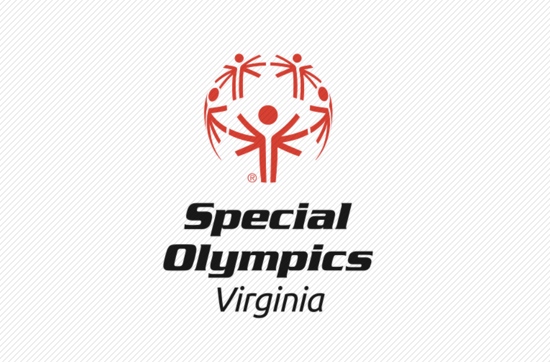Special Olympics strives to change lives beyond Summer Games
This organization is doing some AMAZING work.

Roughly 1,300 athletes from across Virginia will compete in several events at this weekend’s Special Olympics Virginia Summer Games, the largest Special Olympics games in the state.
“It’s a wonderful celebration of people with intellectual disabilities, and the Richmond community, and Special Olympics, and what we’re all about,” said Rick Jeffrey, president of Special Olympics Virginia. “It’s all free to the public. We encourage people to come.”
Much of what the thousands of parents, hundreds of coaches, and roughly 3,000 cheering volunteers1 see will be the six sports athletes compete in: swimming, track and field, softball, bocce, bowling, and power lifting.2 “You will see an event that’s all positive. It’s all about can-do, it’s all about abilities, it’s not about what people can’t do,” Jeffrey said about the Summer Games.
But the most remarkable part of the games is the Healthy Athletes program.
On Saturday, dentists, optometrists, audiologists, and physical therapists will provide tens of thousands of dollars-worth of service to some of the country’s most underserved people.
“Several years ago, we began to realize that the population that we deal with, people with intellectual disabilities…on the whole is very marginalized with regard to healthcare and access healthcare,” Jeffrey said.
According to Jeffrey, 15 percent of the intellectually disabled suffer from some visual impairment. Roughly 29 percent can’t pass a hearing test. About 35 percent suffer from preventable tooth decay. “And tooth decay is a precursor to a lot of other problems: heart disease, cancer, diabetes.” He said that of those who wear prescription eyewear, 64 percent need new glasses.
The Healthy Athletes program provides a range of services to those deprived of adequate health care. Funding comes from grants, Special Olympics International, and support from Richmond-based Fortune 500 Company Owens & Minor.
At this year’s Healthy Athletes area, about 15 dental chairs will be paired “with some of the best dentists in town,” Jeffrey said. “You can get a tooth extracted, you can get a cavity filled. We’ll do over $30,000 worth of dental work alone.”
Special Olympics Virginia began offering these dental services to the intellectually disabled three years ago, becoming the first organization in the country to do so, Jeffrey said.
He recalled one person from last year’s event. “We had a young lady from Virginia Beach who hadn’t been to a dentist in 10 years. She spent three hours in the dental chair, and when she got out she said it was the first time in 10 years her mouth had not hurt.”
Audiologists from James Madison University will also conduct hearing tests and diagnose issues. “You can go home with a hearing aid that might be worth $3,000 – $5,000,” Jeffrey said.
In addition to performing full exams, optometrists “will grind a pair of glasses for you on the spot,” Jeffrey said. Glasses that require advanced grinding will be done off-site and later mailed to the individual.
In previous years, athletes participating in the Games were granted access to the Healthy Athletes area. This year, athletes who are not participating in the games can avail themselves of the services.
“Special Olympics is the largest provider of health care initiatives in the world for people with intellectual disabilities. And most people don’t realize we’re doing that,” Jeffrey said. “We’re very proud of it. It’s a very, very significant thing that we’re able to accomplish here.”
Jeffery said the organization will ensure the Healthy Athletes program sustains itself “so that in 2030, we’re still doing this stuff to a greater degree.”
One of Special Olympics Virginia’s biggest champions is Virginia law enforcement. Jeffrey said that various state law enforcement agencies have collectively raised $1.1 million in the past 12 months.
Virginia’s law enforcement officials are called the “Guardians of the Flame” because each year over 2,000 Virginia officers from over 200 Virginia agencies take part in a five-legged torch run, which this year began on May 31st. “All five legs will run into Richmond and culminate on Friday” when a single torch enters a darkened Robins Center during the opening ceremony. “It’s a symbolic piece of the program,” Jeffrey said. “Lighting the Flame of Hope, the hope that all of our athletes will have a more inclusive lifestyle.”
The closing ceremony on Saturday evening will honor the work of State Senator Don McEachin (D-Richmond) and others who helped draft and pass new legislation that allows for individuals to voluntarily indicate on their driver’s license if they have an intellectual disability, like autism. Jeffery said this new law will help officers better identify and understand the needs of many Virginians.
The new law is another step toward helping those with intellectual disabilities live the inclusive lifestyle Jeffery and others want them to have. That inclusion starts with Richmonders and other Virginians attending the free games to cheer on its athletes.
“Everybody who comes into contact with Special Olympics, our athletes and our program, will be a little bit different after you come into contact with it than you were before you did,” he said. “And we think it’ll be for the better.”
- “As Chris Mooney, the [men’s] basketball coach at the University of Richmond, said: ‘It’s not a special win if the stands aren’t full of fans.’ And that’s exactly what we want to try and do. Get folks in to be part of the action and be part of Summer Games.” You can register to cheer here. ↩
- Here are the days, times, and locations for this year’s events. ↩
-
Recommend this
on Facebook -

Report an error
-

Subscribe to our
Weekly Digest





There are no reader comments. Add yours.